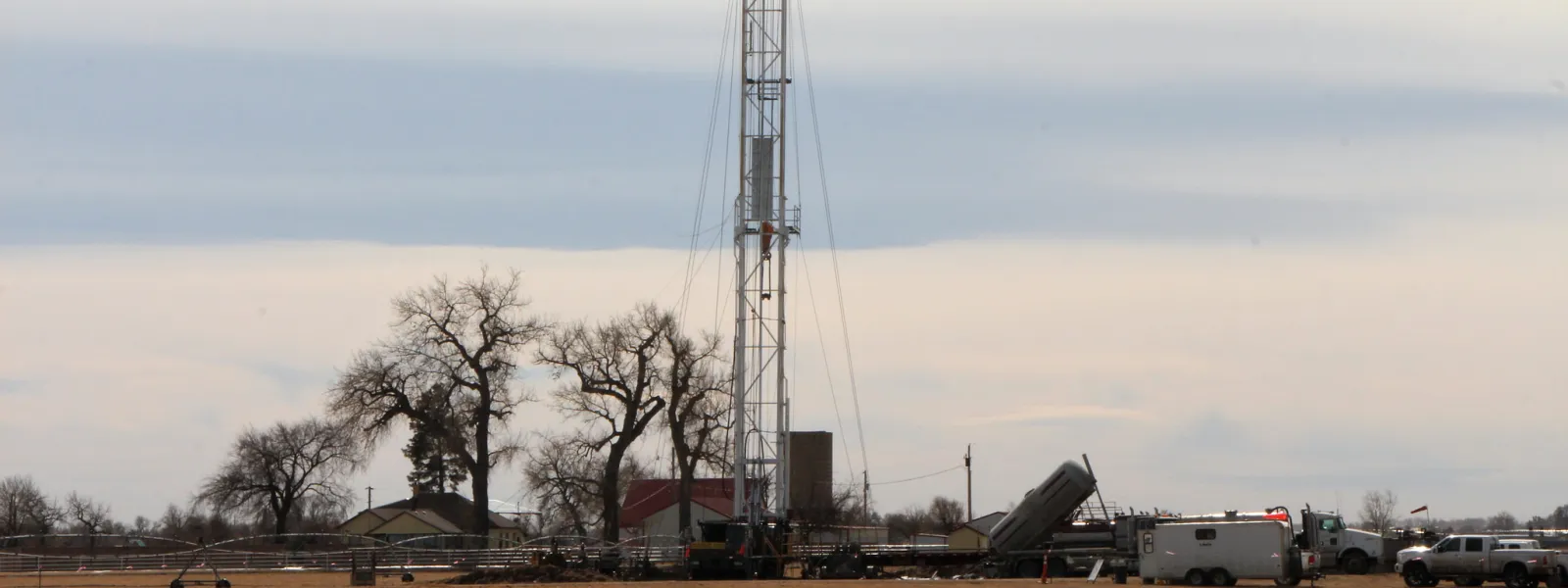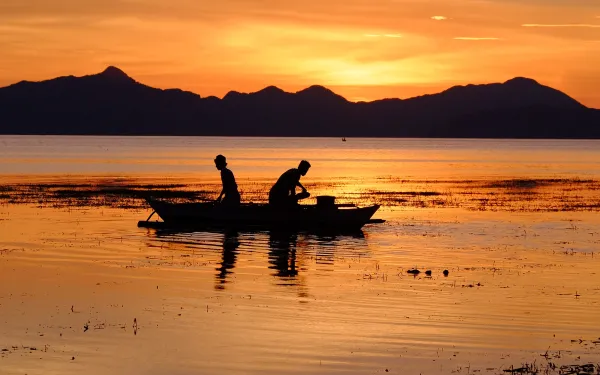
Project
Foto: Andrés ÁngelStopping the spread of fracking in Latin America
“Fracking” is short for hydraulic fracturing, a process used to extract oil and natural gas from historically inaccessible reservoirs.
Fracking is already widespread in the global North, but in Latin America, it is just beginning. Governments are opening their doors to fracking without understanding its impacts and risks, and without consulting affected communities. Many communities are organizing to prevent or stop the impacts of fracking, which affect their fundamental human rights. But in many cases they require legal and technical support.
What exactly is fracking, and what are its impacts?
A straight hole is drilled deep into the earth. Then the drill curves and bores horizontally, making an L-shaped hole. Fracking fluid—a mixture of water, chemicals, and sand—is pumped into the hole at high pressure, fracturing layers of shale rock above and below the hole. Gas or oil trapped in the rock rises to the surface along with the fracking fluid.
The chemical soup—now also contaminated with heavy metals and even radioactive elements from underground—is frequently dumped into unlined ponds. It may seep into aquifers and overflow into streams, poisoning water sources for people, agriculture, and livestock. Gas may also seep from fractured rock or from the well into aquifers; as a result, water flowing from household taps can be lit on fire. Other documented harms include exhausted freshwater supplies (for all that fracking fluid), air pollution from drill and pump rigs, large methane emissions that aggravate global warming, earthquakes, and health harms including cancer and birth defects.
AIDA’s report on fracking (available in Spanish) analyzes the viability of applying the precautionary principle as an institutional tool to prevent, avoid or stop hydraulic fracturing operations in Latin America.
Partners:

Related projects

What is a just energy transition?
It is possible to propose real solutions to current problems. The various crises facing humanity—climate, energy, food, environment, health—as well as the enormous inequalities that cause, and are deepened by, them can be overcome if we manage to rethink the systems in which we live. In 2021, the energy sector contributed 73.2 percent of total global greenhouse gas emissions. The current energy system, based on fossil fuels, is unequal and inequitable. It is concentrated in large private or state-owned companies, is particularly conflictive in terms of access to resources, and is closed to social participation in decision-making. For these reasons, progress on the energy transition is urgent. There is no single view of energy transition; it is a concept in dispute. Toward what? For whom? How? Conservative views focus the transition on a process of technological substitution toward a change in the energy matrix focused on renewable resources and the search for energy efficiency. On the other hand, the most complete proposals warn that a change in the energy matrix is necessary, but not enough. They see the transition as a process of integral transformation, territorially situated and plural, which implies the creation of new socio-political conditions that restructure the organization, ownership and distribution of the current production and consumption systems. The goal is advancing the right to energy. If we consider the transition as a systems change, it is essential to build another type of relationship between human beings, nature and means of production. Guidelines for thinking about the energy transition in Latin America Based on the arguments of Pablo Bertinat, an expert on the subject, to walk this path in the region requires that we: Build the right to energy as a collective right, in congruence with the rights of nature. We must: take into account the damages to territories and communities created by energy development; eradicate Sacrifice Zones by recognizing their vulnerability; and guarantee respect for human rights during the transition. Solve energy poverty problems with clean, accessible, reliable and affordable energy. Energy projects must benefit the territory in which they are installed in terms of creation, supply and work force, in order to achieve the redistribution of wealth. Advance a process of energy reduction in the face of a scenario of restriction in which resources do not cover the demand. This implies an integral transition. A new productive model based on the availability of energy must be considered, as well as rethinking transportation systems, agriculture, infrastructure, etc. Deepen the change of the energy matrix from processes of resignification of technologies to those that are adequate, that is to say, that allow social inclusion, that are built from the communities, that are oriented to solve their problems, and that take into account the processes of acceptance of new energy enterprises. Promote energy democratization processes through the participation of diverse actors, particularly excluded sectors, in decision-making regarding the transition and the creation and implementation of policies, guaranteeing the rights of access to timely and complete information, quality participation and access to environmental justice, in order to ensure energy autonomy at the local level. In conclusion, speaking of a just energy transition implies recovering energy as a tool to satisfy human needs in a context of finite resources and inequalities. We must not start from scratch. Local communities, academic institutions, non-governmental organizations, social organizations and governments have already taken important steps towards a just, democratic and popular energy transition in the region. With this momentum, the transition is not only desirable, but possible.
Read more
5 reasons to end coal extraction and use
The use of coal to generate energy began two thousand years ago. Today, its role as a fuel must come to an end: the negative impacts of its exploitation and use far outweigh the benefits. The solution to the climate crisis lies, in large part, in ending dependence on coal. Across the region, we’re seeing a growth in coal projects that conflicts with global emissions reduction targets. In a post-pandemic context, nations must commit to an economic recovery that keeps coal in the ground. As governments and companies across Latin America continue to promote the industry and ignore the true costs of coal, we’re offering them five reasons why the mining and burning of coal is a bad decision – economically, politically, environmentally, for human rights and the climate. 1. Coal is economically unviable due to the high costs of its impacts. The current production chain fails to consider the external costs derived from coal’s climate and environmental impacts, and social damages and it causes, which could double or even triple the price of electricity generated. For example, exporting a ton of coal from Colombia to Europe, the United States or Asia entails estimated external costs between $144.64 and $210.95 per ton, three times the market price of coal (which was $47.80 per ton in August 2019) (1). The exploitation and use of coal becomes economically unviable because the market price is not enough to cover the repair of the damage caused. The most serious aspect is that since the companies in the industry do not assume these costs, they are left in the hands of States, communities and ecosystems. 2. Coal projects create unemployment Arguments that coal mining stimulates development wherever it is carried out are a myth. The pollution created by coal mining impacts the health of the people exposed to it, affecting their work effectiveness and putting them at a disadvantage in accessing other work options. This results in up an unemployment rate of up to 40 percent in populations located near coalmines. In addition, the non-conventional renewable energy industry currently employs many more people than the coal industry. According to the International Renewable Energy Agency, that industry generated 11 million jobs worldwide in 2018, while the 10 countries with the most coal-dependent labor sources only generate approximately 225 thousand jobs. According to UN estimates, switching to renewable energies could generate up to 35 million additional jobs between 2020 and 2050. 3. Investing in coal is increasingly risky Both banks and insurance companies are ceasing to invest in the coal sector because of its high costs, high risks and low profitability. Today, 26 of the world's 35 largest banks have policies restricting financing for projects related to coal mining or coal-fired power generation. In fact, a group of OECD countries recently announced that they will end financial support for coal-fired power plants. Similarly, at least 18 of the world's largest insurance companies have decided to restrict activities linked to the coal industry. This shows that, thanks to public pressure, the industry is being de-financed and its market is no longer insurable. 4. Coal use aggravates the global climate crisis The extraction and burning of coal aggravates the climate crisis and causes vast human rights impacts: among them floods that displace residents, fires that destroy villages and ecosystems, and droughts that destroy crops. According to the Intergovernmental Panel on Climate Change, coal is responsible for 44 percent of carbon dioxide (C02) emissions from fossil fuels. Just nine countries are responsible for 85 percent of global emissions from its combustion. Coal mining also emits methane, a gas with 67 times more power than CO2 to warm the planet over a 20-year period and whose emissions are responsible for about 25 percent of global warming. Building new coal-fired power plants implies catastrophic climate change. This is why the UN proposed urgently accelerating the decarbonization of all aspects of the economy. To stay on track toward limited warming just 1.5°C by 2050, 90 percent of coal must remain in the ground. 5. Coal mining and use violate essential human rights, such as health. The entire cycle of coal—from its extraction, transport and export, to its burning or combustion—causes irreversible damage to people. One of the main impacts of coal mining is the degradation of air quality, which in turn violates the rights to health, life and a healthy environment, generating high rates of morbidity and mortality. The damages caused by coal mining include pneumoconiosis (black lung), known as "the miner's disease", which considerably reduces the life expectancy of those who work in mines and the surrounding communities, where children are the most affected. Likewise, pollutant emissions from coal-fired power plants are mainly responsible for the formation of microscopic particles (PM10 and PM2.5) capable of penetrating the respiratory and blood systems, increasing the rates of serious diseases such as lung cancer, and causing premature deaths. These five reasons are at the same time arguments for the decarbonization of Latin America's energy matrix. The region can and should direct its efforts towards a matrix based on non-conventional renewable energies that are environmentally friendly, people-friendly and sustainable over time. For more information, see our report Carbón, un combustible condenado al entierro. El final de una era y la promesa de una transición justa. (1) Precios actualizados a 2019 tomados de Cardoso A. Behind the life cycle of coal: Socio-environmental liabilities of coalmining in Cesar, Colombia. Ecological Economics 120 (2015) 71- 82, y Cardoso A., Santamaria R,. Peñalver L. (2019). Thetrue cost of coal in Colombia.
Read more
Latin American fisheries are at risk
By Magie Rodríguez (AIDA) and Ernesto Fernández Monge (The Pew Charitable Trusts) Fishing is fundamental to the Latin American economy and, for of our region’s people, their way of life. It’s a centuries-old industry at risk. According to the Food and Agriculture Organization of the United Nations, the region produces 21.5 million metric tons of fish each year, a quarter of the world's annual production. Roughly 2.3 million people are involved in fishing activities. However, the industry is losing out to aggressive foreign fleets, mostly from Europe and Asia, fishing within Latin America's exclusive economic zones (EEZs) and in areas just outside them. Unlike domestic vessels, these fleets often benefit from substantial funding from their home governments, which allows them to fish outside their own countries' waters. These fishing subsidies, intended to increase capacity, are harmful. They pay for fuel and other expenses, artificially reduce the cost of fishing, and allow fleets to fish in areas where it would otherwise be unprofitable to do so. After more than two decades of talks, the 164 member governments of the World Trade Organization (WTO) are closer than ever to agreeing on a new globally binding treaty that would curb harmful subsidies that allow fleets to fish both in other countries' waters and on the high seas. Fishing offshore, on the periphery of another nation's waters, can harm a country's fisheries in part because it allows foreign vessels to catch migratory species, such as tuna or billfish, before they enter the EEZ. As trade ministers prepare to meet in Geneva for a WTO ministerial conference June 12-15, Latin American leaders must push for a fisheries subsidies agreement that will help their countries' fishermen better compete with foreign fleets. To do so, the agreement should eliminate all capacity-enhancing subsidies that prop up so-called distant-water fishing and allow more fishing than the market would otherwise sustain. Each year, governments around the world dole out $22 billion in harmful subsidies to fisheries and, of that amount, nearly two-thirds comes from just six countries and the European Union. About one-third of that amount, $7.2 billion, is targeted to help countries fish in other nations' EEZs and offshore at the edge of those territorial waters, according to a new research-based tool developed by scientists at the University of California, Santa Barbara, with funding from The Pew Charitable Trusts. The increase in distant-water fishing is driven by a sad reality: having depleted fish stocks in their own waters, major fishing nations are looking elsewhere to fill their nets. Ecuador's Galapagos Islands made headlines last year when research revealed that in just one month, 300 Chinese vessels spent 73 thousand hours fishing off the EEZ surrounding the Galapagos. In addition, the tool shows that, for example, 180 vessels from just four countries (China, South Korea, Chinese Taipei and Spain) spent a total of 84 thousand hours fishing in Argentina's EEZ in 2018. That's the equivalent of 9.6 years on the water. That undertaking was made possible by nearly $92 million in harmful subsidies. Encouragingly, leaders across the region have long supported reducing subsidies in distant waters: Argentina, Chile and Uruguay co-sponsored a WTO proposal in 2019 to ban such subsidies and, in July 2021, Uruguay's foreign minister stated that such a ban would have "enormous potential to have a significant impact on the state of the oceans and the livelihoods of fishing communities." However, major fishing nations are seeking to water down the text of the potential WTO agreement so that they can continue fishing in other countries' waters. That’s why Latin American trade ministers must continue to push for the elimination of subsidies in distant waters, helping to ensure that fish from their waters primarily reach their vessels, restore competitive advantage to the region's fishermen, and sustain a vital industry—and livelihood—across the continent.
Read more